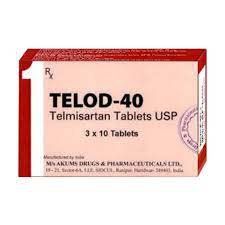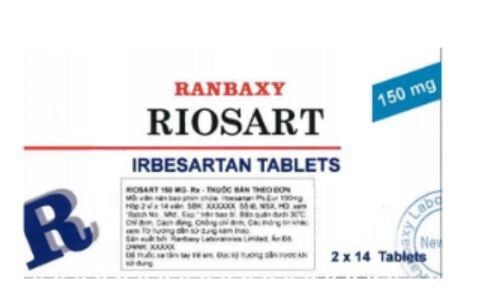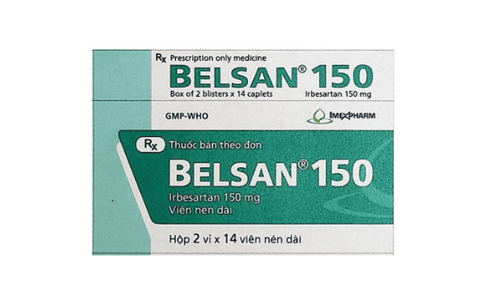This is an automatically translated article.
Irbesartan and Hydrochlorothiazide are commonly used antihypertensive drugs in clinical practice. The combined use of these two active ingredients in the drug Apibestan both increases the effectiveness of blood pressure control and increases the patient's adherence to treatment. So how is Apibestan used and what should be noted?
1. What is apibestan?
Apibestan is a combination product between Irbesartan and Hydrochlorothiazide, with 2 strengths: Apibestan 150 /12.5mg and Apibestan 300/25mg. Irbesartan in Apibestan is an active ingredient in the AT1 receptor blocker group of Angiotensin-II, thereby completely inhibiting Angiotensin-II, so it increases Renin and Angiotensin-II concentrations, and at the same time reduces plasma Aldosterone levels. The remaining active ingredient in Apibestan is Hydrochlorothiazide belonging to the Thiazide diuretic group, which has the effect of lowering blood pressure through the mechanism of reducing plasma volume and extracellular fluid due to sodium diuresis. Later in treatment, hydrochlorothiazide provides an antihypertensive effect through a decrease in peripheral resistance as the blood vessels gradually adapt to the hyponatremia. Hydrochlorothiazide may increase the effect of other antihypertensive drugs such as irbesartan.
2. Indications and contraindications of the drug Apibestan
Apibestan is indicated primarily for the treatment of primary hypertension in patients whose blood pressure is not optimally controlled on Irbesartan or Hydrochlorothiazide alone.
However, the following cases should not use Apibestan:
Patients who are allergic or hypersensitive to Irbesartan, Hydrochlorothiazide or any of the ingredients in Apibestan; Patients with a history of allergy to Sulfonamide derivatives (because Hydrochlorothiazide is a derivative of Sulfonamide); Apibestan is not indicated for pregnant and lactating women; Some of the contraindications associated with Hydrochlorothiazide include severe renal impairment (creatinine clearance less than 30 mL/min), hypokalemia or hypercalcemia, and patients with liver disease (eg, severe hepatic impairment, biliary cirrhosis, and stasis). secret).
3. Dosage of the drug Apibestan
Apibestan products are recommended to be used only once a day, can be taken with or without food. The recommended dose is 1 Apibestan 150/12.5 tablet per day. Dosage of Apibestan is adjusted according to the dose of the individual components (Irbesartan and Hydrochlorothiazide).
Apibestan 300 /25 may be indicated for cases of blood pressure not controlled by Irbesartan 300mg or Apibestan 150 / 12.5.
The use of higher doses than 1 Apibestan 300/25 tablet per day is not recommended.
4. Side effects of the drug Apibestan
Adverse effects of Apibestan may be related to Irbesartan or Hydrochlorothiazide.
Adverse effects of Irbesartan were generally mild and transient. In which the most common are:
Dizziness, headache; Orthostatic hypotension (dose-related), the risk is higher in hypovolemic patients (e.g. when taking high-dose diuretics); Renal failure and severe hypotension in the presence of bilateral renal artery stenosis. The uncommon and rare side effects of Irbesartan in Apibestan include:
Skin rash, urticaria, itching, angioedema; Increase liver enzymes ; Hyperkalemia; Muscle pain, joint pain ; A cough; Respiratory or digestive disorders; Tired ; Decrease in neutrophil count. The most common side effect of Hydrochlorothiazide is excessive potassium loss, which is dose dependent and can be controlled at low doses (Apibestan 150/12.5). Other common side effects include fatigue, dizziness, lightheadedness, headache, hyperuricemia, hyperglycemia, or hyperlipidemia (when used in high doses).
5. Drug interactions of Apibestan
The interaction of Apibestan with other antihypertensive agents may enhance the antihypertensive effect. Apibestan at recommended doses can be safely combined with other antihypertensive agents, including beta-blockers or calcium channel blockers.
Drugs that affect blood potassium: The hypokalemic effect of Hydrochlorothiazide is minimized by the potassium-sparing effect of Irbesartan. However, the hypokalemic effect of Hydrochlorothiazide may occur when apibestan is combined with other drugs that also cause hypokalemia, such as potassium-sparing diuretics, laxatives, amphotericin, carbenoxolone, sodium penicillin G or derivatives of salicylic acid). Conversely, when apibestan is used in combination with potassium-sparing diuretics, potassium supplements, or other drugs that may increase blood potassium (such as heparin sodium) may potentiate the hyperkalemic effect of irbesartan.
Lithium: The renal clearance of lithium is reduced by thiazide diuretics. Therefore, the risk of Lithium toxicity may be increased when combined with Apibestan.
Because Apibestan contains Hydrochlorothiazide, which belongs to the group of thiazide diuretics, interactions may occur when used with the following drugs:
Alcohol, barbiturates or narcotic sleeping pills may increase the risk of orthostatic hypotension; Oral antidiabetic drugs and insulin need to be adjusted in dose because apibestan can increase blood glucose; Corticosteroids when combined with apibestan may increase the risk of hypokalemia; Muscle relaxants (eg Tubocurarine) may potentiate the effects of Hydrochlorothiazide; Quinidine: Increased risk of torsades de pointes, leading to ventricular fibrillation and death; Apibestan may decrease the effects of anticoagulants or gout medications.
6. Precautions when using Apibestan 150 and Apibestan 300
Precautions while using Irbesartan:
Hypovolemia may increase the risk of excessive hypotension with the use of Apibestan, especially after the first dose. Hypovolemia can be caused by strong diuretics, people on a salt-restricted diet, diarrhea or vomiting a lot...; Renal artery stenosis increases the risk of severe hypotension and renal failure with irbesartan, especially in bilateral renal artery stenosis; When using preparations containing Irbesartan (such as the drug Apibestan) in patients with renal failure, it is necessary to periodically check the concentration of potassium and creatinine in the blood; Particular caution should be exercised when apibestan is used in patients with mitral or aortic stenosis or hypertrophic obstructive cardiomyopathy; Patients with primary hyperaldosteronism are not recommended to be treated with irbesartan. Some cautions related to the active ingredient Hydrochlorothiazide
Because apibestan contains Hydrochlorothiazide, patients must be periodically monitored for electrolyte levels in the blood and urine, especially in people who are taking corticosteroids, ACTH, digitalis or Quinidine; Patients with liver failure when using Hydrochlorothiazide (such as Apibestan) are at risk of hepatic coma; The hypotensive effect of hydrochlorothiazide is enhanced in patients undergoing sympathectomy.
Please dial HOTLINE for more information or register for an appointment HERE. Download MyVinmec app to make appointments faster and to manage your bookings easily.













